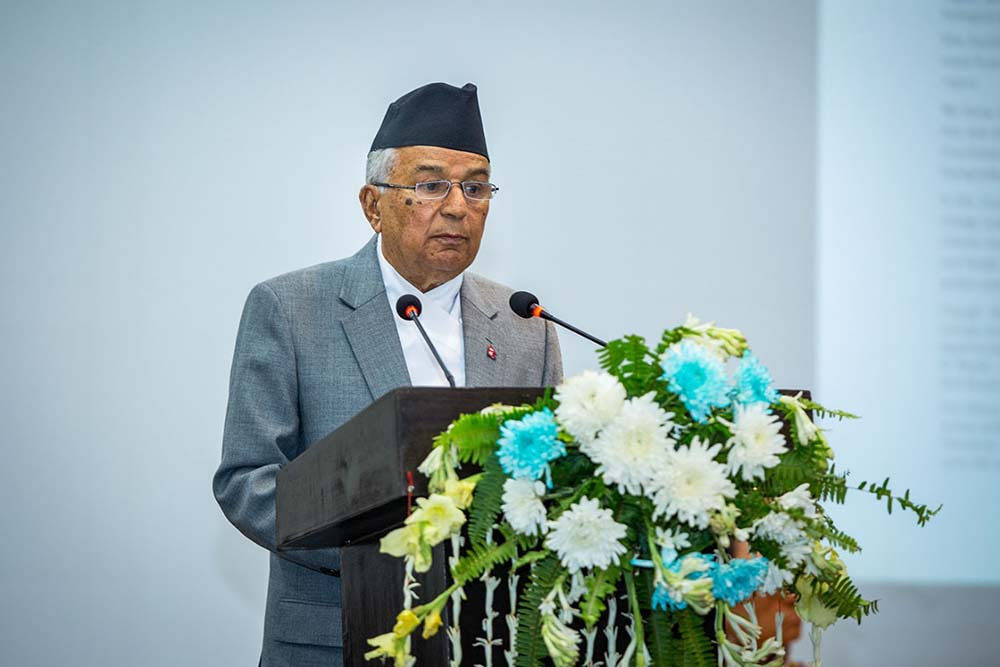
KATHMANDU: President Ramchandra Paudel has called upon the people concerned to minimise the impact of climate change in the Hindu Kush Himalayan (HKH) region to ease the lives of people there.
While addressing a ceremony organised to mark the 40 years of ICIMOD (The International Centre for Integrated Mountain Development) in Lalitpur today, the President said snow melting, outbursts of glacier lakes, landslides in the hills and flooding in the southern plains are visible consequences of climate change and they have significant harm on economy, environmental system and the humanity.
"Countries like Nepal suffer a higher level of impact of climate change though they have almost no role in the greenhouse emissions and the climate change," the Head-of-the-State said recalling his meeting with United Nations Secretary General Antonio Guterres who visited Nepal from October 29 to November 1, drawing the attention of the world towards consequences of climate change Nepal is suffering though it has no role for carbon emissions.
He also stressed that it should be taken into consideration that countries like Nepal are the prime beneficiaries of financial and technical support aiming to mitigate the impact of climate change.
Stating that climate change in the Himalayan region, and environmental and biodiversity degradation have had their impacts not only within the national territory, but beyond the border and globally, President Paudel urged member countries and other concerned sides to come together and cooperate for the resolution of such problems, and univocally raise such common agendas in the international forum.
It will be appropriate to bring along around 2 billion people and coastal countries who have received environmental service from the HKH in the efforts to address the negative impacts of climate change, he advised.
Stating that Nepal is committed to the institutional development of ICIMOD and the sustainable development of the HKH region, the President said, "The Hindu Kush region remains an important treasury for food, energy, water, and cultural and biological diversities for the entire world."
The lives of one-third world's population are ecologically dependent on the HKH region, the President said, highlighting its significance and essence. The consequences of climate change are intense in HKH due to its sensitive geographical structure and fragile socio-economic condition, according to him.
The President who attended the event as the Chief Guest, stated, “ICIMOD has been a vital force in promoting regional cooperation and sustainable development. The 40th anniversary is a moment to recognise its impact and renew our commitment to the shared vision for the HKH region,” and emphasized the continued collaboration needed to address the evolving challenges in the HKH region.
Nepal has prioritised cooperation with neighbouring countries and international partners on the issues of climate change, environmental degradation, disaster risk reduction, biodiversity conservation and livelihood, he said.
Similarly, National Planning Commission (NPC) Vice-Chairman Min Bahadur Shrestha said since the mountains play an important role in climate adaptation on the earth, there is a need for cooperation for the sustainable and inclusive development of the Himalayan region while accepting it as the world's property.
Norwegian Ambassador to Nepal Torun Dramdal and Chair of ICIMOD Support Group expressed the continued support for the development and capacity enhancement of HKH.
Karma Thsering, Chair of ICIMOD Board, stressed the need for working together to build a more sustainable and prosperous future for the HKH region and its people.
Pema Gyamtsho, Director General of ICIMOD, stated, “ICIMOD's 40-year legacy is a testament to our resilience and the collaborative efforts of our partners. We’ve addressed diverse challenges, enabling sustainable development in the HKH. As we move forward, our ambition remains high, guided by the lessons of the past.”
Under the theme “Moving Mountains 2030”, the event highlighted ICIMOD’s journey and its commitment to shaping the future of the HKH region. The 40th-anniversary agenda included a series of key moments, showcasing ICIMOD’s achievements and the enduring partnerships that have fuelled its success. This moment marks an opportunity to consolidate urgent actions for the future in the context of the triple planetary crisis of climate change, pollution and biodiversity loss.
The anniversary event featured a range of activities, including the release of a commemorative book highlighting four decades of ICIMOD’s contributions, launched by President Paudel, and the inauguration of a new annexe building.
During the event, the winners of the Dr Andreas Schild Memorial Mountain Prize were announced. The Mountain Prize sets out to amplify the voices of those on the front lines of the climate crisis in the HKH, recognising outstanding individuals and groups actively engaged in on-the-ground sustainable solutions. This year’s winners were Sathi Eco Innovation India and Rupani Foundation Pakistan (RFP).
Also attending the event was Bhutan’s Advisor for the Ministry of Agriculture and Livestock and Governor of the Royal Monetary Authority, Dasho Penjore, and high-level representatives from other member countries of ICIMOD –Nepal, India, China, Bangladesh and Pakistan. Attendees also included ICIMOD’s Board and Support Group members from the region and beyond, as well as the diplomatic corps based in Kathmandu.
Following the signing of the Agreement at the UNESCO headquarters in Paris on September 30, 1981, by the Government of Nepal and the United Nations Educational, Scientific and Cultural Organisation (UNESCO), ICIMOD was established and inaugurated in December 1983 with its headquarters in Nepal’s capital. As per the ICIMOD Act 2040 (1983), ICIMOD was mandated to carry out study, research and other necessary functions to develop the mountain area of HKH regions in an integrated manner.

